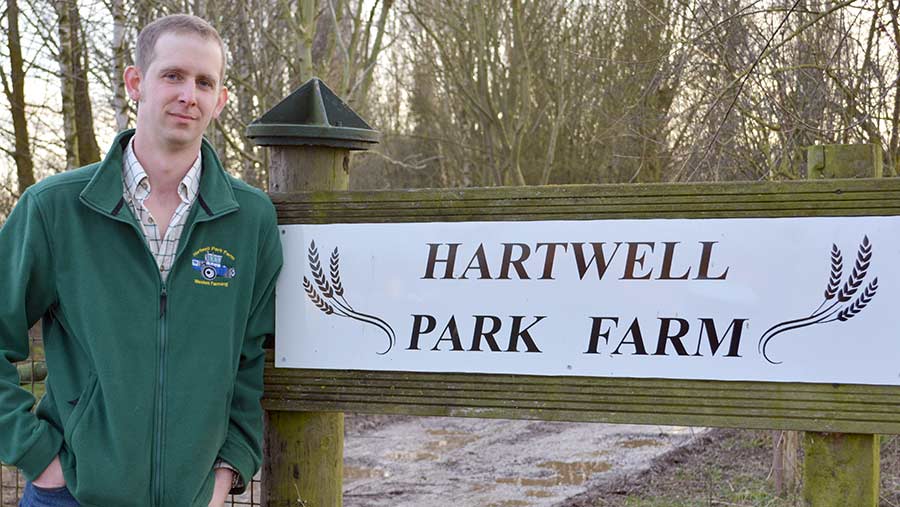How cybercriminals target farmers and machinery buyers
 © ING Image
© ING Image Fraudsters are targeting UK farmers as unwitting middlemen in an international farm machinery scam which is costing victims thousands of pounds.
The scam involves creating fake websites using business details based on real farms.
The websites are then used to advertise non-existent tractors and equipment for sale at bargain prices – luring in victims who pay hefty deposits for farm machinery that doesn’t exist.
See also: Farmers told to consider insurance cover for cybercrime
Philip Weston, of Hartwell Park Farm, Northampton, first realised something was wrong when people started getting in touch to collect farm machinery they thought they had purchased from him.
But Mr Weston is not a machinery dealer and had advertised nothing for sale.

Philip Weston
The first phone call he received was from a man in Romania. “He said he was looking for a Komatzu digger and had seen one for sale on our website,” explained Mr Weston.
“But I said we didn’t have a digger for sale – and we didn’t have a website either.”
How to report fraud and cyber crime
Farmers who fear they have been a victim of cyber crime should report it to Action Fraud – the UK’s national reporting centre for fraud and cyber crime.
Action Fraud takes crime and information reports on behalf of the police and gives advice and fraud prevention guidance.
Reports can be made via Action Fraud’s online fraud reporting tool, which takes respondents through a series of questions.
It can take 20- 30 minutes to complete the form and report the fraud. Once submitted, the report will be sent for assessment by the National Fraud Intelligence Bureau (NFIB). If there is enough information, it will then be sent to a police force for investigation.
Lost deposits
Over the coming weeks, Mr Weston received another phone call – and then another. Sometimes the calls were from Romania, other times they were from other European countries.
But they were all from people who wanted to arrange collection of machines they had purchased.
“The story from a lot these people was that they had laid down deposits for these machines and wanted to come and collect them.
But as soon as they went to organise the haulage, they couldn’t get hold of the people they had paid the deposit to – so they were phoning me instead.”
The people calling Mr Weston had all been scammed – paying their deposits through a fake website that had been set up by the scammers using Mr Weston’s real farm business name and company details.
The website looked real – but it wasn’t, despite being extremely convincing.
How the scam works
- Scammers set up a fake website advertising farm machine for sale. The machinery doesn’t exist, but the postal address and company details listed on the website are based on a real farm business – so anyone checking the website thinks the website is legitimate.
- Further farm business details are obtained from Companies House. Despite being based abroad, the crooks also set up a fake UK-based phone divert number and posted it on the website, so anyone calling hears a UK dial tone and thinks it is real.
- Innocent farmers browsing the internet to buy farm machinery find the website. They see a bargain-priced tractor or piece of equipment, make an inquiry and then pay a deposit – again through the website – with a view to paying the outstanding balance on collection.
- After arranging haulage to collect their purchase and making the final payment to the seller, the would-be purchaser finally realises they have been scammed. The machine doesn’t exist and although the postal address is real, it has nothing to do with the website.
- The criminals – who can’t be traced – bank their winnings. If their fake website gets taken down by the internet service provider, they simply set up a new website based on another real farm and the scam continues.
Criminal investigation
Things could have turned nasty when two men turned up at Mr Weston’s farm. They had travelled all the way from Iceland.
“It took a long time to persuade them they had been scammed and we had nothing for sale,” says Mr Weston. “After a while, they left – I felt really sorry for them.”
Armed with the website details, Mr Weston was eventually able to track down the hosting company and get the website taken down.
He also reported the scam to Action Fraud and National Trading Standards. A criminal investigation is under way.
“Each person told me they paid deposits of up to €4,000,” Mr Weston told Farmers Weekly. “We are arable farmers and have nothing to do with construction or farm machinery sales. But we still had to explain to the people scammed that they had been the victim of fraud.”
What to do if you are scammed
Farmers buying machinery should never part with any money as a deposit before they have physically seen the piece of equipment in question, says Nigel Wellings, director of rural insurers Farmers & Mercantile.
Would-be buyers should check the background of the person and company offering the machine for sale – and inspect it on the premises of a registered dealer, says Mr Wellings, who believes website fraud is more widespread than many people are willing to admit.
Mr Wellings says two of his farmer clients have been victims of the website scams over the past six months. In both cases, scammers set up fake websites in the farmer’s name to sell agricultural machinery – and then collected deposits from innocent victims.
“These farmers then had lorries turn up on their farm to collect kit that doesn’t exist. They have been used or caught up in a scam that has absolutely nothing to do with them. Sometimes they then receive legal letters demanding the deposit – which they never received – is repaid.”
To lessen the chances of being caught up in a scam, Mr Wellings recommends that farmers do regular web searches for their own farm businesses to check whether a fake website has been set up in their own name – and get them taken down if they find one.
Eight ways to spot a fake website
Fake, fraudulent or scam websites can be difficult to spot – but consumer rights organisation Which? offers eight pointers to look out for.
- Double-check the domain name
Fraudulent websites often reference well-known brands or product – or have names similar to genuine websites. - Is the offer too good to be true?
Products offered at low prices with ridiculous discounts should raise suspicions. If prices seem too good to be true, they often are. - Never pay by bank transfer
Alarm bells should ring if you are asked to pay for something online by transferring money direct into another bank account. - Browse the website
Watch out for poor English, phrases that don’t sound right, and the lack of a Contact us page – or a contact page that only offers a form to fill out rather than a full address. - Check the returns policy
A genuine company selling online should have a shipping and returns policy on its website – plus detailed terms and conditions. - Read some online reviews
Look at reviews across a number of third-party sources, such as Trustpilot, Feefo or Sitejabber. Check the company’s social media pages too. - Can you trust a trust mark?
Many people trust kitemarks or logos – but just because one appears on the website doesn’t mean it is genuine. Contact the logo company to check. - Look for a padlock
Some browsers show a green padlock next to the website’s URL – which can indicate that a website is trusted and secure.
Source: www.which.co.uk
